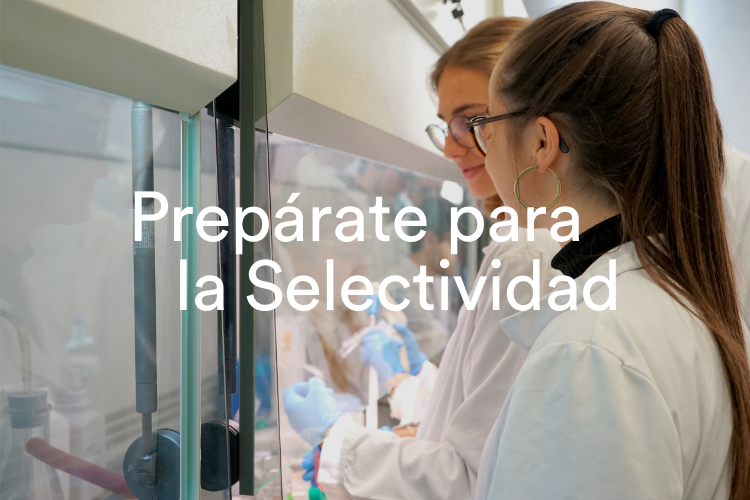Excellent Attendance at the IQS “Preparing for University Entrance Exams” Workshops Aimed at Secondary School Baccalaureate Students

For yet another year, in view of how highly regarded the initial editions were, IQS held an activity aimed at secondary school baccalaureate students so they could practice some of the experimental work that might come up during the Chemistry university access exam.

For yet another year, in view of how highly regarded the initial editions were, IQS held an activity aimed at secondary school baccalaureate students so they could practice some of the experimental work that might come up during the Chemistry university access exam.
As set out in the Guidance Document for the Chemistry university access exam, the coordinating group for the chemistry subject establishes 12 experimental work questions that could be asked in the chemistry exam, either under the "Description of experimental procedures" or "Interpretation and analysis of experimental work" question types. IQS chose five out of the twelve questions and offered them in an online format over a total of ten sessions, corresponding to two sessions per experimental work question offered. Specifically, the experimental work questions offered in this year's edition were:
- • 2.1. Experimental determination of the heat of a reaction
- • 2.2. Experimental observation of the direction of displacement of an equilibrium when the concentration, the pressure, or the temperature are varied
- • 2.5. Obtaining and interpreting the titration curve of a strong acid or a strong base
- • 2.7. Experimental observation of solubility equilibria of sparingly soluble ionic compounds
- • 2.10. Experimental determination of a battery's WEF
The practice sessions were offered in an online format with the aim of getting participating students to take an active role and engage in the workshop in the most experimental manner possible. Ten sessions were held online over the month of February under the leadership of Dr M. Victoria Codera, an IQS professor with the Department of Analytical and Applied Chemistry, and with the help of IQS student Anna Arias. The participants were given informational documentation in advance. At the beginning of each session, an explanatory lecture was given to help the students understand the dynamics of working in a laboratory. Dr Codera then conducted the experiment, combining images previously recorded in the laboratories and shared during the session, along with explanations and questions that she asked the attendees. As the session progressed, the attendees had to prepare a report of conclusions that helped them better understand the work that was done which could later be used for further study.
A total of 1,387 students signed up for the sessions, mostly secondary school baccalaureate students, but also science teachers from different public and subsidized schools throughout Catalonia. Specifically, secondary school students from the following schools in Barcelona attended the sessions: Betania-Patmos, Canigó, Colegio Montserrat, Dominicas Barcelona, Frederic Mistral, IES Quatre Cantons, IES Príncep de Viana, IPSE, Jesús i Maria, Jesús Maria Sant Andreu, La Salle Bonanova, Liceo Francés, Maristes Sants-Les Corts, Pare Manyanet Les Corts, Pía Balmes, Pía Sarrià, Sagrado Corazón, Sagrado Corazón Diputación, Sagrado Corazón de Sarrià, Salessians Sarrià, Santa Teresa Ganduxer, and Virolai; along with students from the following schools elsewhere in Catalonia: IES Font del Glorieta (Alcover), IES Tres Turons (Arenys de Mar), IES La Llauna (Badalona), IES Pla de l'Estany (Banyoles), IES Badia del Vallés, IES Castellbisbal, IES Josep Lluís Sert (Castelldefels), IES Joan Miró (Cornellá de Llobregat), IES Francesc Macià (Cornellá de Llobregat), Sagrado Corazón (El Vendrell), Garbí-Pere Vergés (Esplugues de Llobregat), IES Flix, Santo Ángel (Gavá), IES Narcís Xifra y Masmitjá (Girona), IES Santiago Sobrequés (Girona), Montessori-Palau (Girona), Cervetó (Granollers), Pineda (Hospitalet del Llobregat), SEK-Catalunya (La Garriga), IES Lauro (Les Franqueses del Vallès), IES El Pedró (L’Escala), IES Caparella (Lleida), Maristes Montserrat (Lleida), Mater Salvatoris (Lleida), La Salle (Manlleu), IES Pompeu Fabra (Martorell), Montcau La Mola (Matadepera), Pía Santa Ana (Mataró), IES La Serra (Mollerussa), La Salle Montcada, Hamelin Laie International School (Montgat), IES Vinyes Velles (Montornés del Vallès), Vedruna (Palamós), IES Puig-reig, IES Vallvera (Salt), La Farga (Sant Cugat del Vallés), Viaró International School (Sant Cugat del Vallés), IES Sant Feliu de Guíxols, IES Anton Busquets i Punset (Sant Hilari Sacalm), IES Can Puig (Sant Pere de Ribes), IES Torrent de les Bruixes (Santa Coloma de Gramanet), IES Vall del Tenes (Santa Eulalia de Ronçana), IES Estela Ibérica (Santa Perpetua de Mogoda), IES Taradell, Joan XXIII (Tarragona), IES Comte Rius (Tarragona), Escola Pia Terrassa, IES Aimerigues (Terrassa), Tecnos (Terrassa), IES Lluís Companys (Tordera), Goar (Viladecans), IES Josefina Castellví (Viladecans), IES Josep Mestres i Busquets (Viladecans), and Sant Gabriel (Viladecans).









